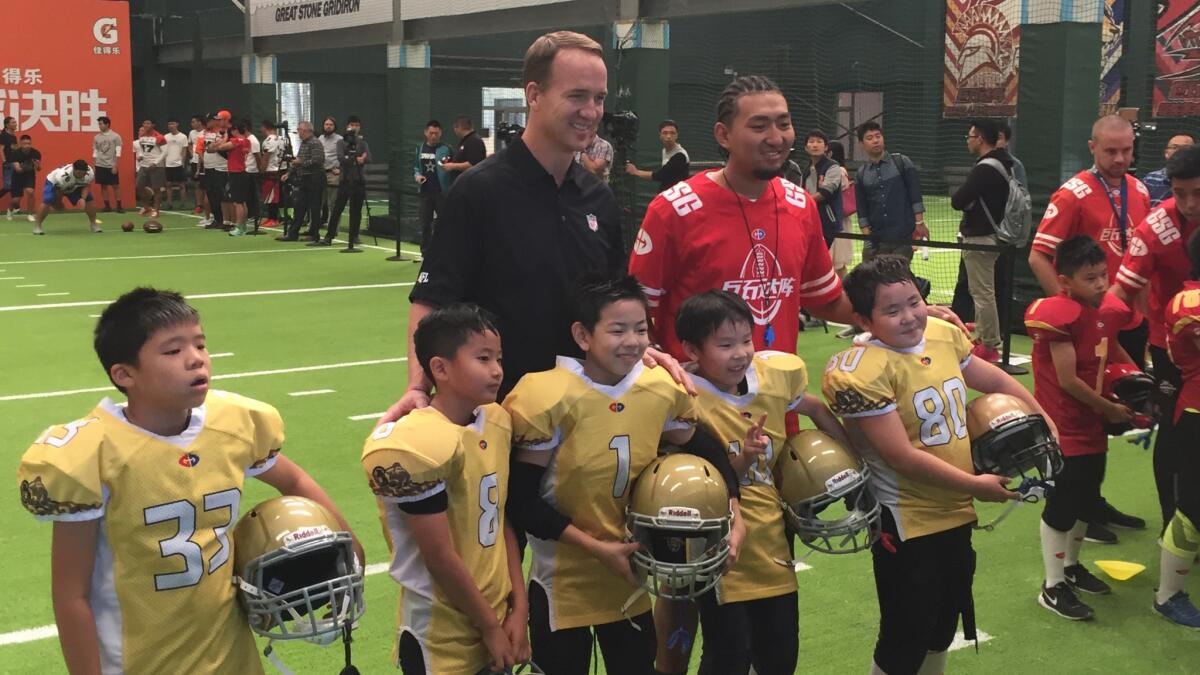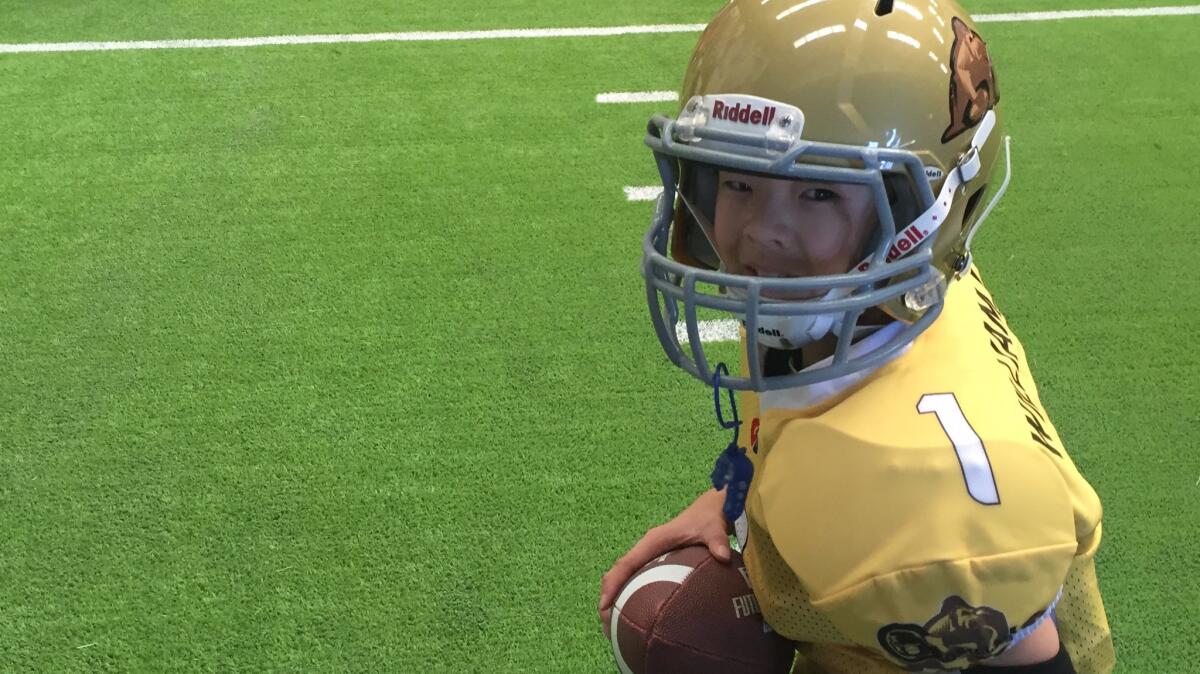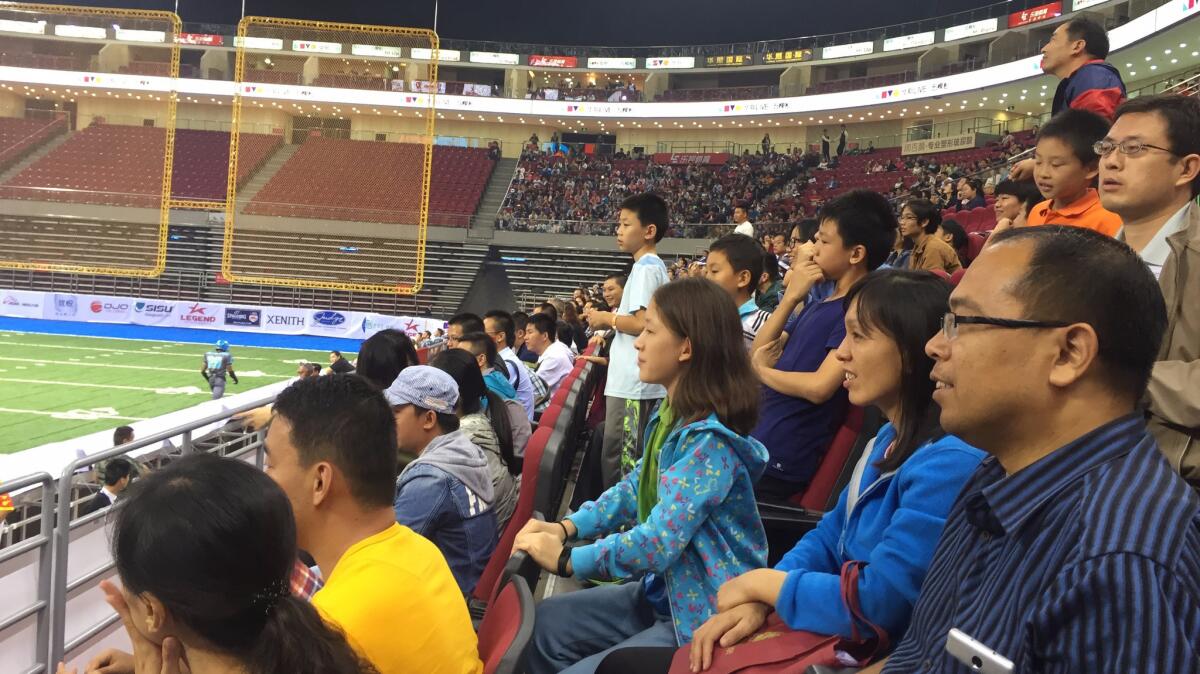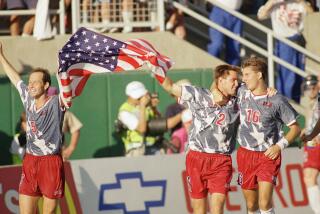American football is gaining traction in China

Reporting from BEIJING — Stadium lights glared through heavy Beijing smog, top-40 bass lines shook the stands, the smell of cheap hot dogs filled the air and the Dalian Dragon Kings strutted onto the field, shouting and clapping in their crisp blue uniforms.
A few hundred had gathered to watch the Dragon Kings take on the Shenzhen Naja, marking the second game in the first season of the China Arena Football League — China’s first professional football league, a scrappy, six-team operation run by a company based in Conshohocken, Pa.
As the game unfolded — snaps fumbled, kicks blocked and touchdowns scored — the children in the stands roared with delight, while their parents whispered quizzically about running backs, field goals and other unfamiliar lingo.
“In the past, I just liked watching the commotion, but now I’m starting to understand the rules,” said Zhang Xinjia, a 46-year-old security guard, his eyes trained on the ball. “No doubt American football will be successful in China — it’s such a confrontational sport.”
Football, America’s most popular sport, does not enjoy a huge footprint in China, the world’s most populous country. For decades, many Chinese have found the rules too byzantine, broadcasts too infrequent, fields and equipment too scarce. Critics say that Chinese parents, repelled by the sport’s high injury rate and fears of concussions, would be reluctant to let their kids play.

Yet that all appears poised to change. American sports entrepreneurs, athletes, even Chinese officials are increasingly promoting the sport in China. The ingredients for widespread popularity may already be in place: China’s middle class is growing, its sports industry booming. In 2013, two former American college football players founded the amateur American Football League of China; now it boasts teams in 14 cities. The National Football League plans to host its first regular-season game in the country in 2018.
“I think in five years, [football] could be a relatively big thing in China,” said Xiao Shen, an NFL commentator on LeSports, an online sports magazine and broadcaster. “I’m very cautiously optimistic.”
Xiao said that Chinese audiences have not yet embraced the sport for several reasons: The NFL did not adopt a sustained China strategy until 2009, Chinese TV stations overlooked the sport and the country for decades lacked a league of its own. Even as soccer grew in popularity and the NBA gained millions of Chinese fans — many drawn to the sport by Houston Rockets star Yao Ming — meishi ganlanqiu, or “American-style football” remained in the shadows.
“I don’t think there’s any one element of football that Chinese audiences absolutely cannot accept,” he said. “But how much they can accept, that’s still unclear.”
Retired NFL quarterback Peyton Manning coached a junior clinic at an indoor field on Beijing’s urban outskirts in late September, while he was in China on a promotional tour. Chinese children in helmets and full pads sprinted, cut and passed, as their well-heeled parents snapped photos with their iPhones.

“I’ve met some rabid football fans [in China] — I mean I met a couple people in Shanghai who knew all of my statistics, including some that I didn’t even know,” Manning said. “And so, there’s potential to see more of these in China. But there’s still some work to be done.”
The players beamed. “There haven’t been any Chinese players in the NFL. I want to be the first one,” said Liu Sicheng, 10. “I super-like playing football. It’s great fun, it trains my mind and I can make a lot of friends.”
The China arena league’s founder, Martin Judge — a football magnate in the U.S. — began planning to bring teams from the American Arena Football League to China in 2012. The AFL, which is independent from the NFL, features a distinct style of gameplay. Teams can field only eight players at a time, compared to the NFL’s 11; they play on fields about the size of an ice hockey rink.
China is a “great marketplace,” said David Niu, the president of Arena Football League Global, the CAFL’s founding organization based in Conshohocken, Pa. The goal, he said, is to find football’s very own Yao Ming — a charismatic hometown hero who will draw Chinese audiences to the sport. The CAFL spent years selecting and grooming its roster of Chinese players, he said.
“We’ve found there are some big guys in China,” he added. “There are athletes who play with their hands above their head because they’re used to basketball. We found some who are fast, from track and field. We found some who are quick, from soccer. We found some who can really wrestle and move, from hand combat sports.”
And the Chinese Rugby Football Association, a government body, has endorsed the league — a good sign for American football’s future in China. Xi Jinping signed off on a list of sweeping reforms to China’s soccer system in spring 2015, and since then, the country has seen an explosion in soccer schools and amateur leagues.
The CAFL features six teams representing Beijing, Shanghai, Qingdao, Dalian, Guangzhou and Shenzhen. Each has 20 players, half of them Chinese and half American.
Edward Wang, the AFL’s vice president of global development, said the Chinese players were not yet as skilled as their American counterparts — most of whom played for the AFL — but they were learning quickly. “This is not just Americans coming over and playing football,” said Wang, a former NFL player and the first Chinese American to play in the league.
The U.S. and Chinese players room together, he said — and lacking a common language, they communicate via a translation function on the Chinese messaging app WeChat. “The purpose is to build the chemistry of the team,” he said. “You don’t want to be divided.”
In Saturday’s game, the Shenzhen Naja pummeled their way to a 47-19 victory over the Dalian Dragon Kings — and despite some hard tackles and dramatic plays, the crowd seemed most riveted when players threw free T-shirts and footballs into the stands.
“I don’t really understand the rules, but my son gets all of it,” said a woman who wanted to be identified only as Ms. Liu, to protect her family’s privacy. Liu, a 40-year-old stay-at-home mom, brought her 12-year-old son to the game; she said that he’s been playing football in a youth league at the recommendation of a teacher, who said it would make him “more manly.”
“My generation, we have much more exposure to Ping-Pong, badminton, sports like that,” she said. “But now, our kids are seeing things like this while they’re still small. And it makes an impression.”
Yingzhi Yang in The Times’ Beijing bureau contributed to this report.
For more news from Asia, follow @JRKaiman on Twitter
ALSO
Beijing’s wai mai drivers: Delivering dumplings and living to tell about it
U.S. cruise lines look for growth in China’s waters
More to Read
Sign up for Essential California
The most important California stories and recommendations in your inbox every morning.
You may occasionally receive promotional content from the Los Angeles Times.










